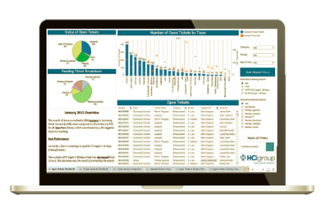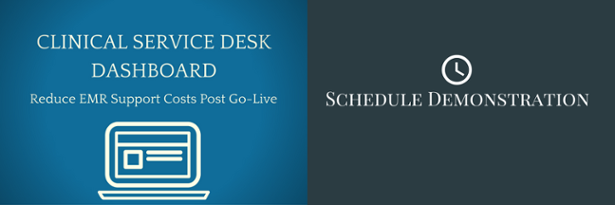Epic Service Desk – Why Analytics Hold The Key

An interview with Mike Sinno
Let’s face it no matter how you slice it, while the benefits are plentiful there’s no escaping the harsh reality that an Epic adds costs on an operating basis. As such, it is important that attention is paid to minimizing the costs of supporting an Epic while maximizing its benefits. In this interview, HCI COO Mike Sinno will discuss ways in which you can do this.
Q: What is the first thing to do when assessing your current Epic support model?
Get visibility into the current state.
There are three different buckets when it comes to supporting Epic support.
- First we have incidents which are quite simply break-fix items, that’s to say, “Well it was working yesterday, it is no longer working today”. Incidents are disruptive, they’re unpredictable and they require immediate attention.
- The second bucket is maintenance. These are the routine tasks that happen on a daily basis along with upgrades, SUs, point releases etc. It’s the equivalent of oil changes in a car, right?
- The third bucket is optimization. The process by which the system is improved through work flow efficiencies, reducing the number of clicks etc.
So visibility into which of these buckets time being allocated is important. Is my time it on operational support? Is it Epic upgrades? Project implementations? Regulatory compliance? Epic workflow optimization? Well the obvious answer is it’s all of the above. But my point in this is do you have the visibility in to your Epic support organization to know where the bulk of your time is being placed? And that type of visibility is what leads to the ability to start reducing the costs of Epic support.
Q: Does a dedicated Epic Service Desk allow you to turn Epic Support from incidents and maintenance to Epic optimization?

It can if it is done right; we often hear that there simply aren’t enough hours in the day to focus on Epic optimization. This is why establishing a dedicated Epic Service Desk is so important, however it must be supported by analytics. Analytics give us insight in to the effectiveness of our operational support model by looking at people, process and technology. So on the people side, where’s the time being spent? Do we know if it is being spent equally across the Epic support model? In other words do you have visibility that shows everything at a departmental level? And if you do, that’s great, can you drill down a little bit further and look at the Epic module team level? Can you look at spending more time on operational support than project management? How does that compare to ambulatory? How does it compare to inpatient etc.? And then lastly within those teams, can you get down to the individual Epic analyst level.
Next we get in to processes. Is our Epic support model aligned with service delivery best practices? Can we measure the ratio of our incidents to maintenance to optimization? Are all of our service requests being routed through a Service Desk or have we developed the relationships with our support staff on the back end to bypass the Service Desk and if that happens and it’s tolerable is that work being captured? So the more important part on the process is having the full view of our support. At HCI we have developed a proprietary Epic Service Desk analytics tool to give you this type of visibility. As the old saying goes…knowledge is power.
Q: What are some of the key questions to ask when assessing the maturity of a current Service Desk?
Well I’d start with do we measure first contact resolution rate? Do we know what our functional escalation rate is to resolve our tickets? And a quick way of saying that is – as a call comes in to the Service Desk, how often do they need to escalate that over to somebody on a Tier 2 side on the Epic back end in order to resolve that? Is the Service Desk currently offering any specialized clinical support? And what I mean by that is when a clinician calls in to the Service Desk, are they able to get their answers to those “How to” type questions resolved? Or is it – as with most Service Desks you know – those agents have to support two other applications in addition to Epic so it becomes a daunting task to become versed in any one application, now matter how important it is to the organization. That is why a dedicated Epic Service Desk is important. And then lastly it’s all about the people. When you have the right people, you get your processes aligned, and are using analytics, your Epic Service Desk can really help your organization reduce operating costs while improving clinical satisfaction with the system.

